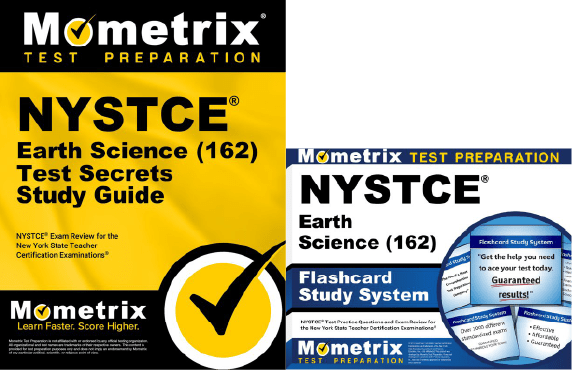If you need help studying for the NYSTCE Earth Science test or just want some more information about what the test is like, you’ve come to the right place.
Click below to take a free NYSTCE Earth Science practice test!
What’s on the Exam?
There are 91 questions on the exam, which are grouped into six competencies, and the time limit is 3 hours and 15 minutes.
The questions are split into two types:
90 questions
Selected-response questions require you to select the correct answer from a list of options. Multiple-choice questions are the most common example, but you may also see true-or-false questions and “matching” questions, which ask you to match terms or concepts with their definitions.
Constructed-Response (CR)
1 question
The constructed-response question requires you to write your answer instead of selecting from a list of choices. Your response to this question is generally expected to be at least a few sentences, but you’ll be given specific details and instructions before you take the test.
Let’s take a closer look at the competencies on the exam.
1. Space Systems
18 questions
- Origin and evolution of the solar system and universe
- The role of gravity in the solar system and universe
- Types of stars and galaxies
- Nucleosynthesis
- Stellar life cycles
- Determining and inferring the scale, proportion, and motions of objects
- The celestial sphere model
- The affect of Earth’s tilt on the seasons
- Moon phases
- Early geologic history of Earth
- Evolution of the biosphere
- The engineering design process pertaining to space systems
- Investigations about space systems
- Reading and inferring from scientific and technical texts and graphics
2. Earth Materials and the History of Earth
18 questions
- Analyzing Earth materials and their properties
- Common minerals associated with major mineral groups
- Recognizing common rocks
- The rock cycle
- Earth’s structure and composition
- Investigations about Earth materials
- Safe and proper use of scientific materials and equipment
3. Geologic Systems
18 questions
- Plate tectonics
- Plate boundary interactions
- Earthquake causes
- The chemical and physical breakdown of rocks
- Erosion vs. deposition
- The cycling of water, carbon, and nitrogen through the atmosphere
- The engineering design process pertaining to geologic systems
- Investigations about geologic systems
4. Water, Weather, and Climate
18 questions
- The hydrologic cycle
- The roles of energy, gravity, and density in the water cycle
- Thermohaline and wind-driven circulation of ocean waters
- Properties of the atmosphere
- Causes of weather
- Weather forecasting
- The climate system
- Climate regions
- Causes of global temperature changes in the past
- Investigations about Earth’s water systems, climate, and weather
5. Human Impacts and Sustainability
18 questions
- Renewable and nonrenewable resources
- Natural hazards
- Human impacts on Earth systems
- The affect of climate changes and natural resource availability on human populations
- The engineering design process pertaining to human impacts and sustainability
- Relationships between Earth systems
- Investigations about human impacts and sustainability
6. Pedagogical Content Knowledge
1 question
How to Register
To get started with your registration, you’ll need to create an account on the NYSTCE website. You can then register for the exam and schedule a test date through your account.
Exam Scores
The test is scored using a scaled scoring method. Here’s how it works:
For every question you answer correctly, you get one point added to your raw score. At the end of the test, your final raw score will be converted to a scaled score. This scaled score will range somewhere between 400 and 600.
The reason your raw score is converted to a scaled score is because everyone who takes the test is given a slightly different set of questions. Since everyone has a different arrangement of questions, and because some questions are harder than others, converting your raw score to a scaled score ensures a more even playing field.
FAQs
How many questions are on the NYSTCE Earth Science exam?
The exam contains 91 questions.
What is the time limit for the NYSTCE Earth Science exam?
The exam is timed at 3 hours and 15 minutes.
What is the passing score for the NYSTCE Earth Science exam?
You’ll need to get a final score of at least 520 to pass.
How much does the NYSTCE Earth Science exam cost?
The testing fee is $122.
NYSTCE and New York State Teacher Certification Examinations are trademarks of the New York State Education Department and Pearson Education, Inc. or its affiliate(s). This page was developed by Mometrix Test Preparation. It was not developed in connection with Pearson Education, Inc., nor was it reviewed, approved or endorsed by these agencies.



 NYSTCE Study Guide
NYSTCE Study Guide NYSTCE Flashcards
NYSTCE Flashcards